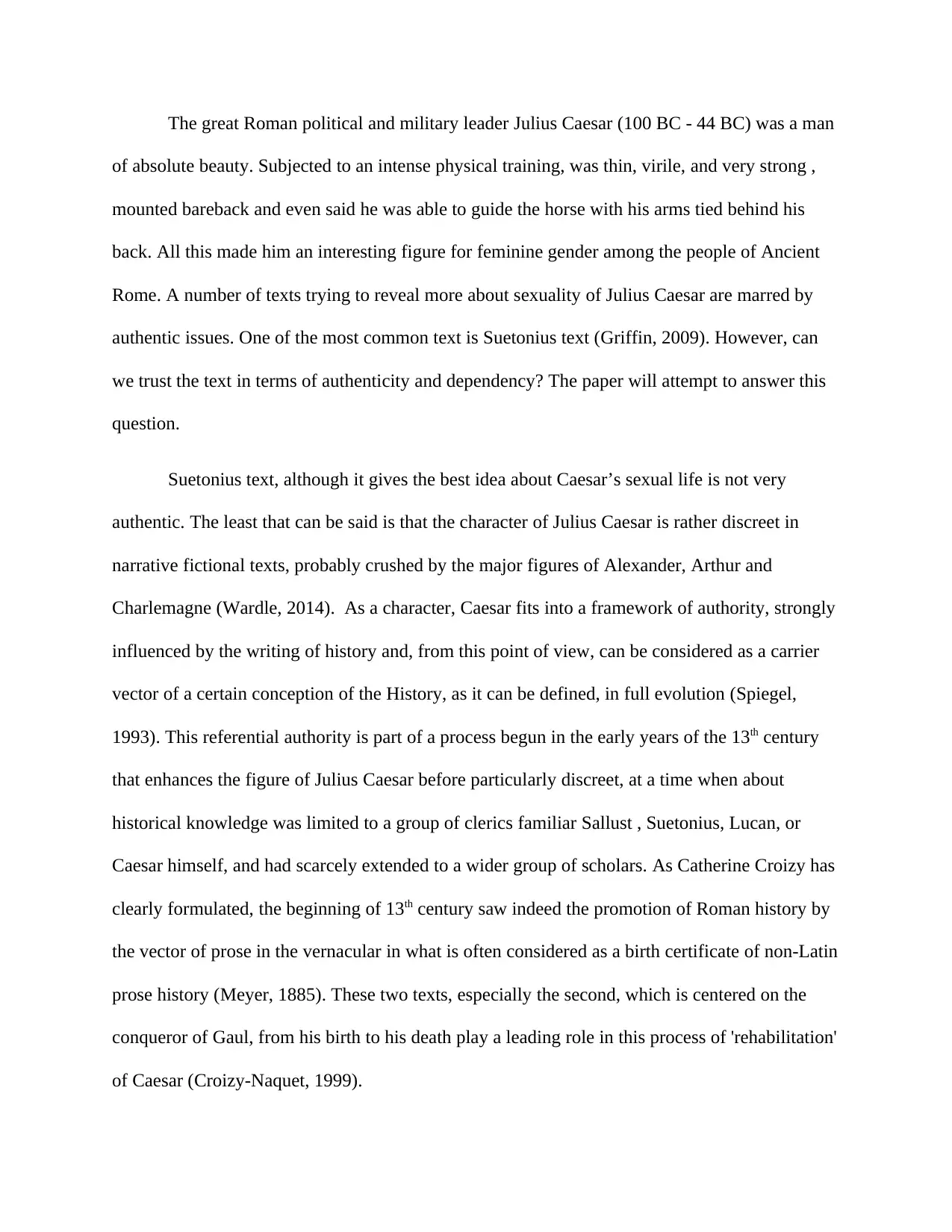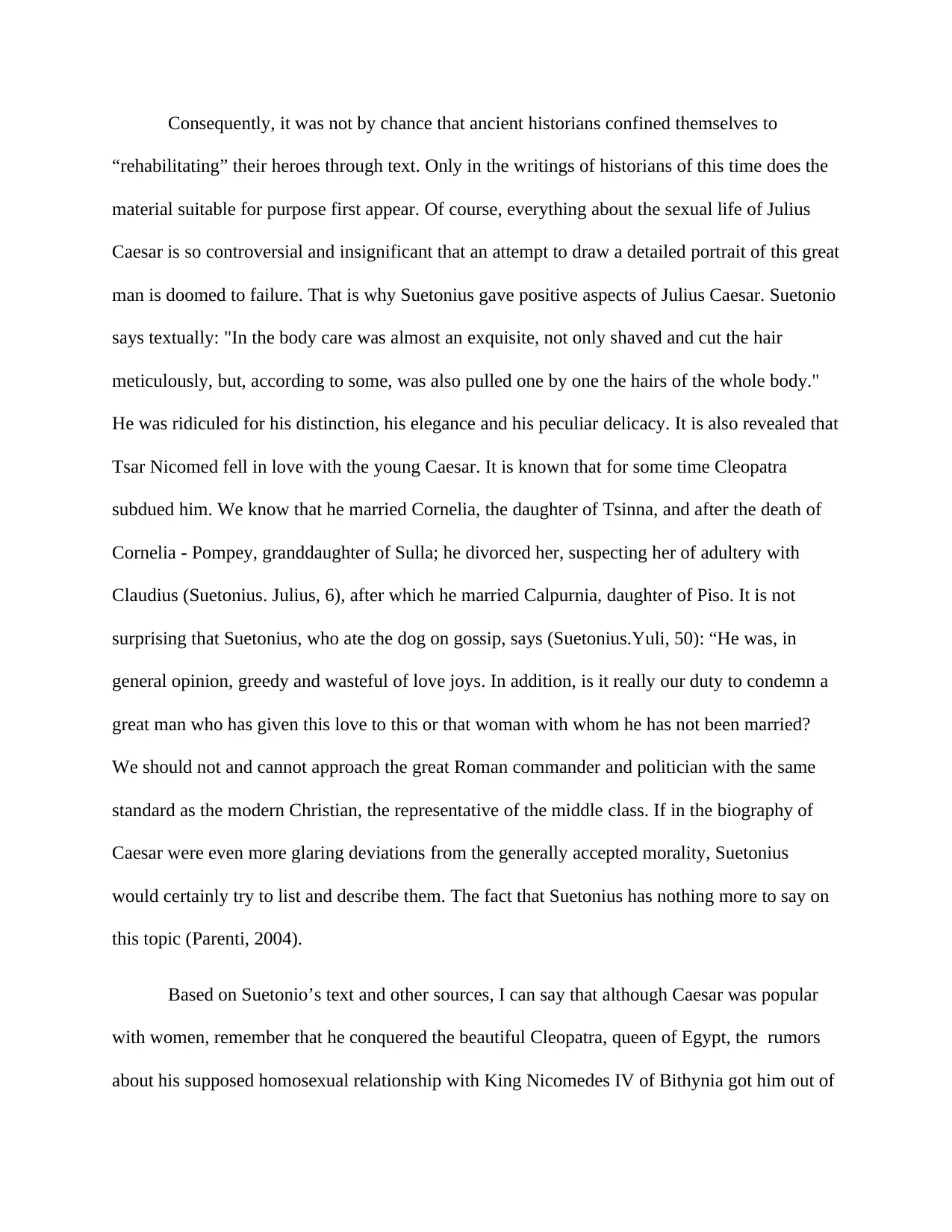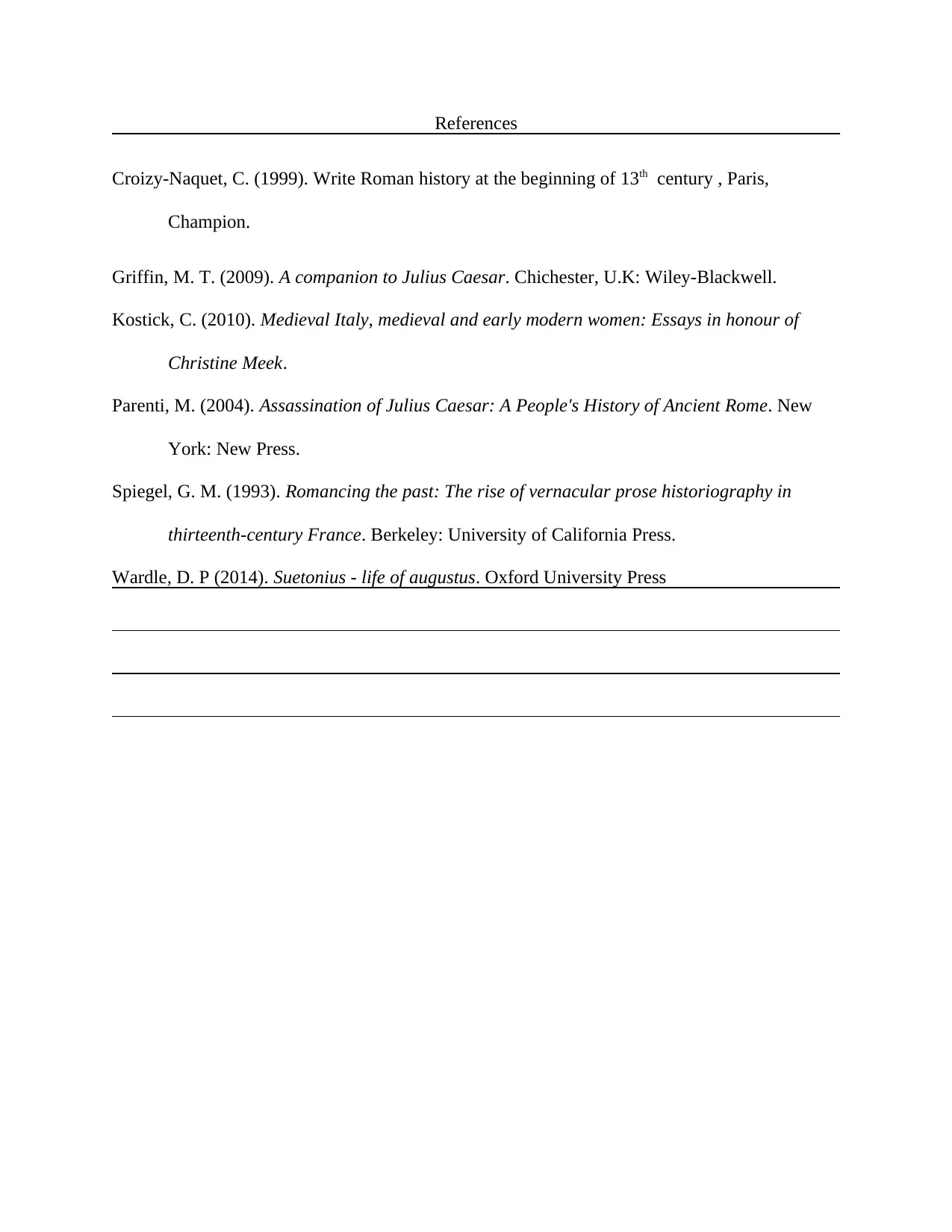The Sexual Life of Julius Caesar: A Critical Analysis of Suetonius
VerifiedAdded on 2023/06/04
|5
|1086
|473
Essay
AI Summary
This essay delves into the sexual life of Julius Caesar, primarily examining the historical text of Suetonius to assess its authenticity and reliability. It questions the historical context in which Suetonius wrote, particularly the trend of 'rehabilitating' historical figures like Caesar. The essay explores various aspects of Caesar's personal life, including his marriages, alleged homosexual relationships, and his reputation among the Roman populace. Ultimately, the essay argues that Suetonius' text, while providing valuable insights, is not entirely dependable due to the prevailing biases and historical revisionism of the time. The analysis draws upon additional historical sources to provide a more nuanced understanding of Caesar's sexuality and its portrayal in historical accounts.

Sexual life of Julius Caesar
Student’s Name
Institution
Date
Student’s Name
Institution
Date
Paraphrase This Document
Need a fresh take? Get an instant paraphrase of this document with our AI Paraphraser

The great Roman political and military leader Julius Caesar (100 BC - 44 BC) was a man
of absolute beauty. Subjected to an intense physical training, was thin, virile, and very strong ,
mounted bareback and even said he was able to guide the horse with his arms tied behind his
back. All this made him an interesting figure for feminine gender among the people of Ancient
Rome. A number of texts trying to reveal more about sexuality of Julius Caesar are marred by
authentic issues. One of the most common text is Suetonius text (Griffin, 2009). However, can
we trust the text in terms of authenticity and dependency? The paper will attempt to answer this
question.
Suetonius text, although it gives the best idea about Caesar’s sexual life is not very
authentic. The least that can be said is that the character of Julius Caesar is rather discreet in
narrative fictional texts, probably crushed by the major figures of Alexander, Arthur and
Charlemagne (Wardle, 2014). As a character, Caesar fits into a framework of authority, strongly
influenced by the writing of history and, from this point of view, can be considered as a carrier
vector of a certain conception of the History, as it can be defined, in full evolution (Spiegel,
1993). This referential authority is part of a process begun in the early years of the 13th century
that enhances the figure of Julius Caesar before particularly discreet, at a time when about
historical knowledge was limited to a group of clerics familiar Sallust , Suetonius, Lucan, or
Caesar himself, and had scarcely extended to a wider group of scholars. As Catherine Croizy has
clearly formulated, the beginning of 13th century saw indeed the promotion of Roman history by
the vector of prose in the vernacular in what is often considered as a birth certificate of non-Latin
prose history (Meyer, 1885). These two texts, especially the second, which is centered on the
conqueror of Gaul, from his birth to his death play a leading role in this process of 'rehabilitation'
of Caesar (Croizy-Naquet, 1999).
of absolute beauty. Subjected to an intense physical training, was thin, virile, and very strong ,
mounted bareback and even said he was able to guide the horse with his arms tied behind his
back. All this made him an interesting figure for feminine gender among the people of Ancient
Rome. A number of texts trying to reveal more about sexuality of Julius Caesar are marred by
authentic issues. One of the most common text is Suetonius text (Griffin, 2009). However, can
we trust the text in terms of authenticity and dependency? The paper will attempt to answer this
question.
Suetonius text, although it gives the best idea about Caesar’s sexual life is not very
authentic. The least that can be said is that the character of Julius Caesar is rather discreet in
narrative fictional texts, probably crushed by the major figures of Alexander, Arthur and
Charlemagne (Wardle, 2014). As a character, Caesar fits into a framework of authority, strongly
influenced by the writing of history and, from this point of view, can be considered as a carrier
vector of a certain conception of the History, as it can be defined, in full evolution (Spiegel,
1993). This referential authority is part of a process begun in the early years of the 13th century
that enhances the figure of Julius Caesar before particularly discreet, at a time when about
historical knowledge was limited to a group of clerics familiar Sallust , Suetonius, Lucan, or
Caesar himself, and had scarcely extended to a wider group of scholars. As Catherine Croizy has
clearly formulated, the beginning of 13th century saw indeed the promotion of Roman history by
the vector of prose in the vernacular in what is often considered as a birth certificate of non-Latin
prose history (Meyer, 1885). These two texts, especially the second, which is centered on the
conqueror of Gaul, from his birth to his death play a leading role in this process of 'rehabilitation'
of Caesar (Croizy-Naquet, 1999).

Consequently, it was not by chance that ancient historians confined themselves to
“rehabilitating” their heroes through text. Only in the writings of historians of this time does the
material suitable for purpose first appear. Of course, everything about the sexual life of Julius
Caesar is so controversial and insignificant that an attempt to draw a detailed portrait of this great
man is doomed to failure. That is why Suetonius gave positive aspects of Julius Caesar. Suetonio
says textually: "In the body care was almost an exquisite, not only shaved and cut the hair
meticulously, but, according to some, was also pulled one by one the hairs of the whole body."
He was ridiculed for his distinction, his elegance and his peculiar delicacy. It is also revealed that
Tsar Nicomed fell in love with the young Caesar. It is known that for some time Cleopatra
subdued him. We know that he married Cornelia, the daughter of Tsinna, and after the death of
Cornelia - Pompey, granddaughter of Sulla; he divorced her, suspecting her of adultery with
Claudius (Suetonius. Julius, 6), after which he married Calpurnia, daughter of Piso. It is not
surprising that Suetonius, who ate the dog on gossip, says (Suetonius.Yuli, 50): “He was, in
general opinion, greedy and wasteful of love joys. In addition, is it really our duty to condemn a
great man who has given this love to this or that woman with whom he has not been married?
We should not and cannot approach the great Roman commander and politician with the same
standard as the modern Christian, the representative of the middle class. If in the biography of
Caesar were even more glaring deviations from the generally accepted morality, Suetonius
would certainly try to list and describe them. The fact that Suetonius has nothing more to say on
this topic (Parenti, 2004).
Based on Suetonio’s text and other sources, I can say that although Caesar was popular
with women, remember that he conquered the beautiful Cleopatra, queen of Egypt, the rumors
about his supposed homosexual relationship with King Nicomedes IV of Bithynia got him out of
“rehabilitating” their heroes through text. Only in the writings of historians of this time does the
material suitable for purpose first appear. Of course, everything about the sexual life of Julius
Caesar is so controversial and insignificant that an attempt to draw a detailed portrait of this great
man is doomed to failure. That is why Suetonius gave positive aspects of Julius Caesar. Suetonio
says textually: "In the body care was almost an exquisite, not only shaved and cut the hair
meticulously, but, according to some, was also pulled one by one the hairs of the whole body."
He was ridiculed for his distinction, his elegance and his peculiar delicacy. It is also revealed that
Tsar Nicomed fell in love with the young Caesar. It is known that for some time Cleopatra
subdued him. We know that he married Cornelia, the daughter of Tsinna, and after the death of
Cornelia - Pompey, granddaughter of Sulla; he divorced her, suspecting her of adultery with
Claudius (Suetonius. Julius, 6), after which he married Calpurnia, daughter of Piso. It is not
surprising that Suetonius, who ate the dog on gossip, says (Suetonius.Yuli, 50): “He was, in
general opinion, greedy and wasteful of love joys. In addition, is it really our duty to condemn a
great man who has given this love to this or that woman with whom he has not been married?
We should not and cannot approach the great Roman commander and politician with the same
standard as the modern Christian, the representative of the middle class. If in the biography of
Caesar were even more glaring deviations from the generally accepted morality, Suetonius
would certainly try to list and describe them. The fact that Suetonius has nothing more to say on
this topic (Parenti, 2004).
Based on Suetonio’s text and other sources, I can say that although Caesar was popular
with women, remember that he conquered the beautiful Cleopatra, queen of Egypt, the rumors
about his supposed homosexual relationship with King Nicomedes IV of Bithynia got him out of
⊘ This is a preview!⊘
Do you want full access?
Subscribe today to unlock all pages.

Trusted by 1+ million students worldwide

hand (Kostick, 2010). Throughout the city of Rome there was also constant talk of his affair with
a prefect and a certain Rufio , whom historians called " the licentious lover ." The beautiful
young man wore flashy clothes, wearing red shoes, a gold ring with the effigy of his original
mother, Venus, and a tunic with long fringes. To ridicule him, Caesar's enemies called him "the
Queen of Bithynia" and decades later his legionaries still mocked him. Suetonius text is therefore
not authentic and dependable. It was also created at the wrong time and the trend that was there
was to “rehabilitate” the emperor and present him as noble.
a prefect and a certain Rufio , whom historians called " the licentious lover ." The beautiful
young man wore flashy clothes, wearing red shoes, a gold ring with the effigy of his original
mother, Venus, and a tunic with long fringes. To ridicule him, Caesar's enemies called him "the
Queen of Bithynia" and decades later his legionaries still mocked him. Suetonius text is therefore
not authentic and dependable. It was also created at the wrong time and the trend that was there
was to “rehabilitate” the emperor and present him as noble.
Paraphrase This Document
Need a fresh take? Get an instant paraphrase of this document with our AI Paraphraser

References
Croizy-Naquet, C. (1999). Write Roman history at the beginning of 13th century , Paris,
Champion.
Griffin, M. T. (2009). A companion to Julius Caesar. Chichester, U.K: Wiley-Blackwell.
Kostick, C. (2010). Medieval Italy, medieval and early modern women: Essays in honour of
Christine Meek.
Parenti, M. (2004). Assassination of Julius Caesar: A People's History of Ancient Rome. New
York: New Press.
Spiegel, G. M. (1993). Romancing the past: The rise of vernacular prose historiography in
thirteenth-century France. Berkeley: University of California Press.
Wardle, D. P (2014). Suetonius - life of augustus. Oxford University Press
Croizy-Naquet, C. (1999). Write Roman history at the beginning of 13th century , Paris,
Champion.
Griffin, M. T. (2009). A companion to Julius Caesar. Chichester, U.K: Wiley-Blackwell.
Kostick, C. (2010). Medieval Italy, medieval and early modern women: Essays in honour of
Christine Meek.
Parenti, M. (2004). Assassination of Julius Caesar: A People's History of Ancient Rome. New
York: New Press.
Spiegel, G. M. (1993). Romancing the past: The rise of vernacular prose historiography in
thirteenth-century France. Berkeley: University of California Press.
Wardle, D. P (2014). Suetonius - life of augustus. Oxford University Press
1 out of 5
Your All-in-One AI-Powered Toolkit for Academic Success.
+13062052269
info@desklib.com
Available 24*7 on WhatsApp / Email
![[object Object]](/_next/static/media/star-bottom.7253800d.svg)
Unlock your academic potential
Copyright © 2020–2025 A2Z Services. All Rights Reserved. Developed and managed by ZUCOL.